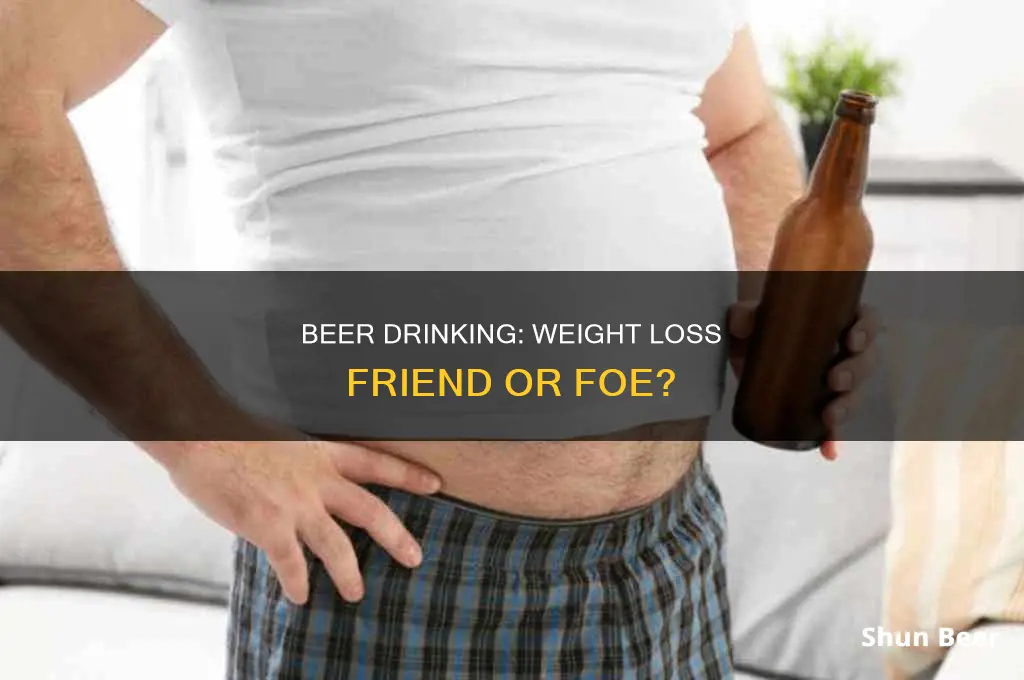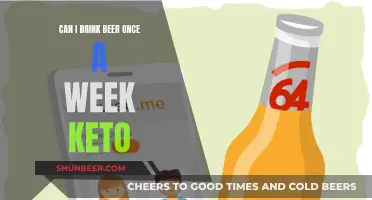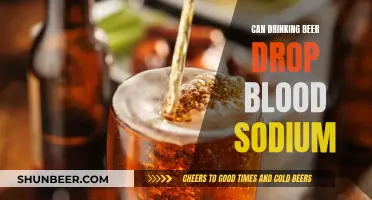
Alcohol is often touted as a culprit for weight gain, but does cutting it out really help with weight loss? The answer is yes, but it's not that simple. While alcohol is high in calories, simply cutting it out may not always lead to weight loss. However, for heavy drinkers, quitting alcohol can lead to noticeable weight loss and improved body composition. Moderate and social drinkers, on the other hand, may not experience significant weight loss by giving up alcohol alone.
Alcohol is calorie-dense, and consistent consumption can lead to excess calorie intake, resulting in weight gain and potentially obesity. It also disrupts the body's metabolism, hindering weight loss. When consumed, alcohol takes priority in metabolism, leading to the storage of dietary fat instead of its breakdown for energy. This metabolic shift promotes fat accumulation. Additionally, alcohol can cause unhealthy food choices, as it affects decision-making processes, making individuals more likely to give in to temptations.
Quitting alcohol can have numerous health benefits beyond weight loss. It can improve sleep quality, enhance mental clarity and mood, reduce the risk of heart disease and cancer, improve liver function, and promote overall well-being. However, the relationship between alcohol intake and weight is complex and varies from person to person. Individual factors such as diet, activity levels, and other lifestyle choices also play a significant role in weight loss. While cutting out alcohol may not be a magic bullet for weight loss, it can certainly help create a calorie deficit, especially for heavy drinkers, making it easier to shed those extra pounds.
| Characteristics | Values |
|---|---|
| Calories | Alcohol is high in calories, with drinks varying widely in their calorie content. For example, a standard glass of wine has 133 calories, a pint of beer has 239 calories, and a bottle of alcopop has 172 calories. |
| Metabolism | Alcohol can disrupt the body's metabolism, making it harder to lose weight. When consumed, alcohol becomes a priority for metabolism, leading to the storage of dietary fat rather than its breakdown for energy. |
| Food Cravings | Alcohol can increase unhealthy food cravings and negatively impact decision-making processes, making it more difficult to make healthy food choices. |
| Liver | Chronic alcohol consumption can overwhelm the liver's capacity to process alcohol, leading to inflammation, oxidative stress, and tissue damage. Cutting back on alcohol gives the liver a break and allows it to repair, recover, and regenerate. |
| Sleep | Alcohol disrupts normal sleep patterns and can lead to sleep disturbances. Reducing alcohol intake can improve sleep quality. |
| Weight Loss | Cutting back on alcohol can facilitate weight loss by reducing calorie intake and promoting healthier eating habits. However, the effect of alcohol on weight loss varies from person to person. |
What You'll Learn

Alcohol is high in calories
Alcoholic drinks are packed with calories. A standard glass of wine has 133 calories, a pint of beer has 239 calories, a bottle of alcopop has 172 calories, and a double measure of gin has around 95 calories. A can of beer has an average of 153 calories, a 5 oz serving of white wine contains 121 calories, and a 1.5 oz shot of vodka has 97 calories. These are not insignificant numbers, given that most people are advised to eat around 2,000–2,500 calories a day. A binge-drinking session could see some people exceed their advised daily calorie intake from alcohol alone.
Alcohol is often referred to as being full of "empty calories". This is because alcohol is a nutrient-void toxin that our bodies must work very hard to process and eliminate as soon as possible. Consuming alcohol means your body has to prioritise metabolising it, which can lead to the storage of dietary fat rather than its breakdown for energy. This metabolic shift can affect weight loss and promote fat accumulation.
Heavy drinkers and binge drinkers are at a higher risk of obesity due to the metabolic changes that occur when your body frequently metabolises alcohol. When your body is working to metabolise alcohol, it can't effectively metabolise food, which causes your metabolism to slow down.
Cutting out alcohol means you are removing empty calories, which can help with weight loss. After two weeks of giving up alcohol, some people find they begin to lose weight, thanks to removing the excess calories associated with alcoholic drinks.
Beer and Pradaxa: Is It Safe to Drink Alcohol?
You may want to see also

Alcohol can hinder weight loss
Secondly, alcohol disrupts the body's metabolism. When consumed, alcohol takes priority in the metabolic process, often leading to the storage of dietary fat rather than its breakdown for energy. This shift can hinder weight loss and promote fat accumulation. Additionally, the body cannot effectively metabolise food while preoccupied with metabolising alcohol, causing a further slowdown in metabolism.
Thirdly, alcohol can lead to unhealthy food choices and increased consumption of high-calorie snacks. Alcohol influences the release of neurotransmitters such as dopamine, serotonin, and oxytocin, inducing a euphoric feeling. However, in heavy drinkers, this effect is blunted, and alcohol intake increases the release of the stress hormone, cortisol. Alcohol also blocks the hormone vasopressin, which prevents the kidneys from getting rid of fluid, leading to frequent urination and dehydration.
Heavy drinkers and binge drinkers are at a higher risk for obesity due to the metabolic changes that occur when the body frequently metabolises alcohol. Prolonged heavy drinking can also interfere with blood sugar regulation by reducing insulin sensitivity. Additionally, alcohol stimulates cravings and may influence hormones linked to satiety (fullness).
While moderate and social drinkers may not experience significant weight loss by quitting alcohol, heavy drinkers are more likely to see weight loss when they stop drinking.
Beer and Sciatica: Can Drinking Beer Hurt Your Sciatic Nerve?
You may want to see also

Drinking less may improve food choices
Drinking alcohol can affect your decision-making processes, making you more susceptible to unhealthy food choices. When under the influence of alcohol, you may be more tempted to eat unhealthier foods and more likely to give in to those temptations.
Alcohol also blocks a hormone called vasopressin, which is responsible for preventing your kidneys from getting rid of fluids. This is why you may feel the urge to urinate frequently after drinking alcohol.
Additionally, alcohol can stimulate cravings and influence certain hormones linked to satiety (fullness). Heavy drinkers and binge drinkers are at a higher risk for obesity due to the metabolic changes that occur when the body frequently metabolises alcohol. When the body is focused on metabolising alcohol, it cannot effectively metabolise food, causing metabolism to slow down.
By cutting down on alcohol, you may find yourself making healthier food choices. You will be more likely to resist unhealthy cravings and make better decisions about what to eat.
Strategies for mindful drinking
If you want to continue drinking alcohol while working towards your health goals, here are some strategies to help you drink in a more mindful way:
- Don't drink on an empty stomach: Drinking on an empty stomach can lead to overdrinking and overeating. Have something to eat beforehand to slow down alcohol absorption and prevent upset stomachs.
- Be mindful of serving sizes: Opt for bottled or canned beers, which typically come in standard serving sizes. For wine, 4 ounces should be about a quarter of the way up a standard wine glass.
- Stick to clear liquors: When ordering cocktails, choose clear liquors like vodka and tequila, and opt for low-sugar mixers.
- Set a drink limit: Decide how many drinks you will have before you start drinking, and stick to that number.
- Alternate with non-alcoholic drinks: Drinking seltzer or another non-alcoholic beverage in between alcoholic drinks will help you stay hydrated, feel fuller, and slow down your drinking.
- Don't drink just for the sake of it: You don't need to drink alcohol to have fun. It's your choice to drink or not, and you don't owe anyone an explanation for skipping the cocktails.
Other benefits of cutting down on alcohol
In addition to improving your food choices, reducing your alcohol intake can have numerous other benefits, including:
- Weight loss: Alcohol is high in calories and can contribute to excess calorie consumption, leading to weight gain. Cutting back on alcohol can help create a calorie deficit, facilitating weight loss.
- Improved sleep: Alcohol disrupts normal sleep patterns and can lead to sleep disturbances. Abstaining from alcohol can improve sleep quality and leave you feeling more refreshed and rested.
- Better digestion: Alcohol can irritate the gastrointestinal tract, causing issues such as bloating, indigestion, and heartburn. Eliminating alcohol can provide relief from these digestive problems.
- Healthier skin: Alcohol is a diuretic, which can lead to dehydration and make your skin appear dry, dull, and tired. By avoiding alcohol, you can maintain better hydration levels, resulting in healthier, more radiant skin.
- Improved liver function: The liver is responsible for processing and removing alcohol from the body. Cutting back on alcohol gives your liver a break, allowing it to repair, recover, and regenerate.
- Improved relationships: Alcohol can impair judgement and make it difficult to communicate effectively. Reducing alcohol intake can foster healthier and more fulfilling relationships, with clearer communication and improved emotional connections.
- Improved mental health: Alcohol can negatively impact brain function and mood regulation, leading to symptoms like brain fog, irritability, and anxiety. Abstaining from alcohol gives your brain a chance to heal and rebalance neurotransmitter levels, resulting in improved cognitive function and emotional stability.
- Lowered risk of disease: Excessive alcohol consumption is linked to an increased risk of heart disease, cancer, and liver disease. Cutting back on alcohol can reduce these risks and improve your overall health.
Maryland Beer Laws: Drinking in Your Yard
You may want to see also

Alcohol can cause unhealthy food cravings
It's common to experience cravings for junk food before, during, or after drinking alcohol. There are several physiological reasons why you might feel hungrier after drinking alcohol. Firstly, alcohol is ethanol, a calorie-dense organic compound. Ethanol is about 7 calories per gram, which is nearly as dense in calories as fat. However, instead of contributing to a feeling of fullness, ethanol does the opposite and boosts the appetite.
Alcohol suppresses the oxidation of fatty acids, which increases hunger and cravings because fatty acids play a role in appetite regulation. Alcohol also increases thermogenesis (calorie utilization causing heat production) in the short term, which means you may feel hungry again faster than usual.
Research has also shown that alcohol stimulates or inhibits neurochemical systems that play a role in appetite regulation. While the exact process is still unclear, researchers have noted that alcohol affects two primary hunger-regulating hormones: Leptin and GLP-1. These hormones suppress appetite and seem to be either directly or indirectly inhibited when alcohol enters the body. As a result, you start feeling hungry after a few drinks, even if you are actually “full”.
Alcohol also stimulates the same neurons in the brain that are triggered when the body goes into starvation mode. This stimulation could even lead to ethanol-induced overeating. Pair this with the well-known fact that alcohol reduces self-control, and it's no surprise that indulging in food cravings and overeating after drinking is commonplace.
How to curb unhealthy cravings after drinking
- Drink water in between alcoholic drinks to stay hydrated and feel more full.
- Eat a nutritious meal before drinking, so you have food in your stomach to help you absorb the alcohol more slowly.
- Prepare a healthy snack ahead of time, so that you're not tempted to make bad eating decisions when drunk.
- Be realistic: recognise that drinking alcohol will biochemically predispose you to make bad eating choices.
Big Beer Mugs: How to Drink Them?
You may want to see also

Alcohol slows down metabolism
The body metabolizes alcohol through two specific enzymes: alcohol dehydrogenase (ADH) and aldehyde hydrogenase (ALDH). The liver is the primary organ responsible for processing alcohol, but the stomach, brain, and pancreas are also involved. The liver breaks down alcohol and removes it from the body, but when alcohol consumption is excessive, it can overwhelm the liver, leading to inflammation, oxidative stress, tissue damage, and even liver disease.
Alcohol is also considered empty calories as it provides energy without offering any nutritional value. These empty calories can contribute to excess calorie consumption and weight gain. Additionally, alcohol can disrupt your body's ability to absorb nutrients, vitamins, and minerals from the food you eat, further impacting your overall health and metabolism.
While some studies suggest that small or moderate amounts of alcohol may boost metabolism and aid in weight loss, excessive alcohol consumption can lead to a slower metabolism, malnutrition, unhealthy weight loss, and increased risk of various health issues. Therefore, it is generally recommended to reduce or avoid alcohol consumption to support a healthy metabolism and overall well-being.
Ozark Beer Choices: What the Characters Drink
You may want to see also
Frequently asked questions
The answer to this question varies from person to person. Heavy drinkers who quit drinking beer may experience weight loss, whereas moderate and social drinkers may not see a significant change.
Beer is calorie-dense, and consistent consumption can lead to excess calorie intake and weight gain. Beer also disrupts your body's metabolism, hindering weight loss and promoting fat accumulation.
Quitting beer can have several benefits for your health and well-being. It can improve your liver function, cardiovascular health, sleep quality, mental clarity, mood, and energy levels. Additionally, it can lead to better food choices and improved relationships.







